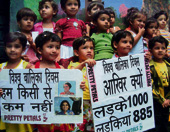 |
| Right to life: A group of little girls carry a placard to protest against female foeticide |
Last month, Parliament voiced its concern over the fact that the courts are yet to convict a single person for female foeticide, despite the law banning misuse of sex determination tests having been brought into force in 1994.
As Parliament discussed the alarming decline in female to male ratio in the country, health minister Anbumani Ramadoss admitted that, in spite of strict penal provisions, the law has failed to check people from killing unborn girl foetuses.
Pre-natal Diagnostic Techniques (Prohibition of Sex Selection) Act, 1994 ? better known as the PNDT Act ? was enacted to prohibit determination and disclosure of the sex of the foetus and selective abortion of the female foetus. So far, only 303 cases have been filed in courts for violation of the Act in 12 years, and, no one has been booked under it as yet.
“Despite the enactment of the law and its considerable tightening through an amendment in 2003, it remains an ineffective piece of legislation because little attention has been paid to its implementation,” says Kamayani Bali Mahabal, senior researcher, Centre for Enquiry into Health and Allied Themes (CEHAT), a Mumbai-based organisation which has been consistently campaigning against sex-selective abortions for over 20 years.
The origin of the PNDT Act can be traced in Maharashtra where women’s groups and health activists successfully lobbied for a state-level law against sex selection in 1988. This law eventually turned into a national legislation eight years later. But the activists soon realised that, in spite of the national law, new technologies (like ultrasonography) coupled with government inaction had turned the PNDT Act ineffective.
Which is why CEHAT, along with Pune-based activist group Mahila Sarvangeen Utkarsh Mandal and an independent activist Sabu George, filed a PIL in the Supreme Court in 2000, alleging that the PNDT Act had failed to achieve its goals. The petition brought to the court’s attention that “the provisions of the Act were not being implemented” and pointed out that certain doctors had even begun selling sex-selection techniques before conception.”
The PIL led to the amendment of the Act which came into force in 2003 as the Pre-Conception and Pre-Natal Diagnostic Techniques (Prohibition of Sex Selection) or PCPNDT Act. But as soon as the amendment was passed, doctors found out ways to bypass it. “In spite of the amendments, the law remains favourable towards medical professionals ? the chief violators of the law,” says Bali Mahabal. Dr Sanjib Mukhopadhyay, president of the Bengal Obstetrician and Gynaecologists Society, says, “Doctors have no qualms about promoting sex determination tests and the government has never tried to enforce the PCPNDT Act strictly.” Dr Mukhopadhyay says that, contrary to the popular belief, such tests are rampant in West Bengal. “The law has simply helped to raise the fee of such tests threefold ? from Rs 5,000 to Rs 15,000,” he rues.
Throughout the country, the medical fraternity has devised several ingenious methods for communicating the sex of the foetus so that they can’t be booked by law. “While many of the sonologists pass the message verbally, the sex of the foetus is conveyed to the pregnant woman or her family by drawing a leaf (girl) or flower (boy), or asking for a laddoo (boy) or barfi (girl), or by using a specific colour of ink for writing,” says Archana Mehendale, an advocate who had pursued a research project on female foeticide at Bangalore’s National Law School Indian University. She says that booking cases against doctors for sex determination rarely happens because of lack of evidence. “Most of the cases are filed with respect to non-registration of ultrasound machines and not sex determination per se,” says Mehendale.
Besides, the law loses its teeth because few complaints are entertained against erring medical practitioners. “This is a law in which the police has no role to play,” says Bali Mahabal. “People usually complain about a crime to the police but, under this law, it has to be the appropriate authority, that is, the civil surgeon of a public hospital in the locality,” she says. But most people consult private practitioners, and very few are even aware of the existence of a civil surgeon.
Above all, there’s little support from politicians and the state advisory committees. “It’s a nexus between politicians and doctors,” says Dr Mukhopadhyay. “Politicians shield the offending clinics.” Bali Mahabal too agrees that there’s no conviction because no doctor wants to speak out against another doctor.
So is there a way out of the stalemate? “Carrying out sting operations using decoys is one way of catching the violators,” says Mehendale. Vimochana, a Karnataka-based NGO, has used this method to gather evidence against erring doctors. Dalit Mahila Vikas Mandal of Satara in Maharashtra has caught two doctors carrying out sex determination tests. However, both doctors managed to get anticipatory bail. “But even sting operations fail because the message of raids is often leaked to the offending doctors beforehand,” adds Mehendale.










